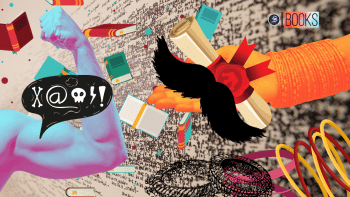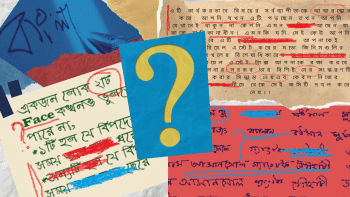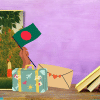Is this year’s Boi Mela a mausoleum of Bangla romance?

Wandering through the bustling lanes of Boi Mela, amidst the cacophony of voices and the rustle of pages turning, I found myself lost in a curious examination of the Bangla love story. It's more than just a literary pursuit, you see. These stories whisper secrets that feel strangely familiar, like forgotten chapters of my own soul. Each turn of the page unveils a kaleidoscope of Bangladeshi life, reflecting not just personal desires, but the intricate tapestry of our culture and society.
Forget the tragic grandeur of Shakespeare or the fiery epics of the West, Bangla love stories are altogether on a different level. They explore love not as a simple connection between two hearts, but as a journey navigating the labyrinth of societal norms. It's about stolen glances across a crowded room, whispered promises under a moonlit sky, and the courage to carve your own path, hand in hand, amidst the complexities of tradition. This unique perspective, where love's journey is as much about societal dance as it is about emotional yearning, is what sets Bangla love stories apart.
And if there is one person who completely changed the Bangla love story scene, it's Humayun Ahmed, who with his unparalleled storytelling, has left an indelible mark on the genre of Bangla romance. His narratives, rich in emotional depth and cultural insight, have become the benchmark for exploring love within the constraints of Bangladeshi society. Through his works, love is not just an emotion but a narrative that encompasses the broader societal and familial contexts, making his stories resonate deeply with readers across generations and leaving a framework for young authors to work on.
In recent years, the landscape of Bangla romance has witnessed a notable shift. While the themes of societal expectations and familial obligations continue to be prevalent, there has been a gradual inclusion of more complex issues such as divorce, breakups, and the challenges of modern relationships. This evolution reflects a broader societal change, where traditional notions of love are being reexamined in the light of contemporary realities. Two good examples would be Poddoja (Anannya, 2024) by Elma Behrouz and Tomar Jonno Dariye Chilam (Anannya, 2024) by Sadat Hossain. These novels, while distinct in their narrative and thematic explorations, collectively underscore the evolving nature of love stories in Bangali culture, resonating deeply with a readership navigating the complexities of modern love and relationships.
Poddoja, a novel that has captured the imagination of countless readers at Boi Mela, is not your conventional love story. It weaves a complex narrative that intersects love, family affairs, and a feminist critique of societal norms. The tale of Poddoja and her husband Hawladar, who is revealed to be a male activist with questionable views, unfolds with an intensity that grips the reader from the first page. The reception of Poddoja speaks volumes about its impact. With all five editions sold out, it's evident that Beherouz has struck a chord with the audience. The novel's popularity, especially on social media platforms where it initially gained prominence in 2020, highlights a shift in the literary tastes of the Bangali readership.
On the other end of the spectrum, Tomar Jonno Dariye Chilam offers a purer, more traditional take on the love story genre. The enduring appeal of the book is indicative of the fact that, despite the changing cultural boundaries and expectations there remains a deep-seated yearning for stories that celebrate the quintessential essence of love.
The digital age has further influenced this narrative shift. Social media and online platforms, once absent from the traditional Bangla love story, are now becoming integral elements of modern narratives. This inclusion not only reflects the changing dynamics of love in the digital era but also challenges authors to integrate these modern elements while maintaining the essence of Bangla romance.
Tanvir Kabir Shaikat among other young authors argue that this modern perspective on love enriches Bangla romantic literature, pushing its boundaries while keeping the essence of love alive. They advocate for storytelling that moves with the times, ensuring that each generation's voice is heard, preserving the vibrancy of our love stories for the future. Sadat Hossain and Anisul Hoque have emerged as favourites among young readers with thrillers indicating a shift in literary preferences. A decade ago, the concept of love was draped in secrecy and personal sacrifices, where waiting and longing played a crucial role in deepening affections. Love thrived on unavailability, making every stolen moment and every exchanged letter precious. However, in today's digital age, where instant communication has become the norm, the once-treasured sense of anticipation and mystery in love seems to have diminished. Social media platforms have made connections so accessible that the value of patience and the thrill of the wait have largely evaporated. As a result, young readers, now more than ever, find themselves drawn to the suspense and adrenaline rush offered by thrillers and psychological dramas. These genres provide an escape into a world of intrigue and excitement, a stark contrast to their everyday lives, which, especially in recent times, have been marked by increased periods indoors due to global circumstances. The current literary landscape, as observed at events like Boi Mela, suggests that thrillers, with their capacity to engage and captivate through suspense and mystery, resonate more with the desires of the modern youth, reflecting a broader cultural transition towards seeking instant gratification and novel experiences over the slow-burning romance of yesteryears.
The popularity of translated works and the emergence of new literary genres at Boi Mela have also contributed to the evolving tastes of Bangali readers. This shift towards a more globalised literary landscape does not diminish the appeal of traditional Bangla love stories but rather enriches it, offering readers a broader spectrum of narratives to explore.
Overall, the evolution of Bangla romantic literature, as witnessed in the bustling aisles of Boi Mela, mirrors the evolution of our collective consciousness. It reflects our struggles, our triumphs, and our ceaseless quest for connection in a world that's perpetually in flux. But still, as I pen down the concluding thoughts, I look forward to the future of Bangla romantic literature. I know that we carry with us the legacy of the past, the innovations of the present, and the promise of new tales that will continue to captivate, inspire, and unite us in the shared experience of love. And so, as the pages continue to turn and new stories emerge from the heart of Bengal, we remain tethered to the infinite stories of love—each a thread in the rich tapestry of Bangla literature, each a reflection of our collective soul. In this endless journey of exploration and discovery, we find not just stories, but reflections of ourselves, our culture, and the timeless quest for love that defines the human experience.
Kazi Raidah Afia Nusaiba is a student at IUB and has a penchant for research and prefers fiction over non-fiction. [email protected].

 For all latest news, follow The Daily Star's Google News channel.
For all latest news, follow The Daily Star's Google News channel. 










Comments